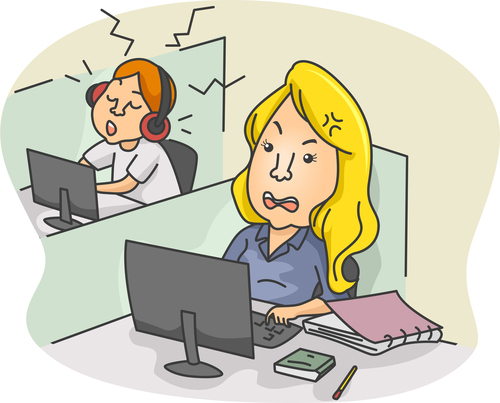
Managing work distractions
If you are plagued with distractions in the workplace, you aren’t alone. It’s one of the most frequent day-to-day work complaints we hear about.
For people with customer service jobs, interruptions are a necessary part of your daily routine, but for the rest of us, it can help to identify the source of interruptions so you can find the right solution.
We’ll list a few common productivity disruptors, along with some ideas for addressing them.
Noisy people: Loud, chatty, interrupting, or gossipy colleagues are a common complaint, particularly for workers in cubicles or open spaces. Here are a few tips for coping:
- If you don’t have a door, position your workstation so that your back will face an interrupter.
- Wear ear plugs or noise canceling headphones.
- Put a note on your cubicle that says “working on deadline” or indicating “open” and “quiet” hours.
- Have an escape plan ready if you are interrupted.
- If you are under serious pressure, see if there is an alternate, quiet place to work for a few hours.
- Talk to your manager about instituting quiet times. It could be an hour or two every morning.
- If someone is a habitual offender, have a one-to-one talk with him/her and request cooperation.
- Ask your manager to make “distractions” an agenda item at your next team meeting and brainstorm ideas together.
- If your workstation is in a high-traffic area, try training yourself to block out noise, which can work over time.

Communication devices: Our technology tools are the root of many distractions: phones, emails, websites, text messages and chat programs. Here are a few tips to manage technology interruptions.
- Turn notifications and sounds off for emails and texts. Instead, sign in to check a few times a day.
- Set up folders to filter emails so important things get through but low priority mail gets filed.
- Keep your personal phone off and check it on breaks and lunchtime. Save personal calls, email, texts and errands for breaks, too.
- Keep a to-do list via a calendar, an app, sticky notes or the old standby, a pen and paper.
- Use a bookmark manager or an app like Dropbox or Pocket to save non-work Web items for revisiting later during breaks or after hours.
Personal distractions: Some distractions might be ones that you bring with you to work, such as an argument with a spouse, debt worries, or finding help for an aging parent. You may benefit by the help of an expert, such as a debt counselor, a family therapist or a stress coach. If so, your EAP can help. Login to your Member site for self-help resources or call the toll-free number 24-7 to talk to a counselor.
1.800.252.4555 or 1.800.225.2527
View more newsletters at www.theEAP.com
